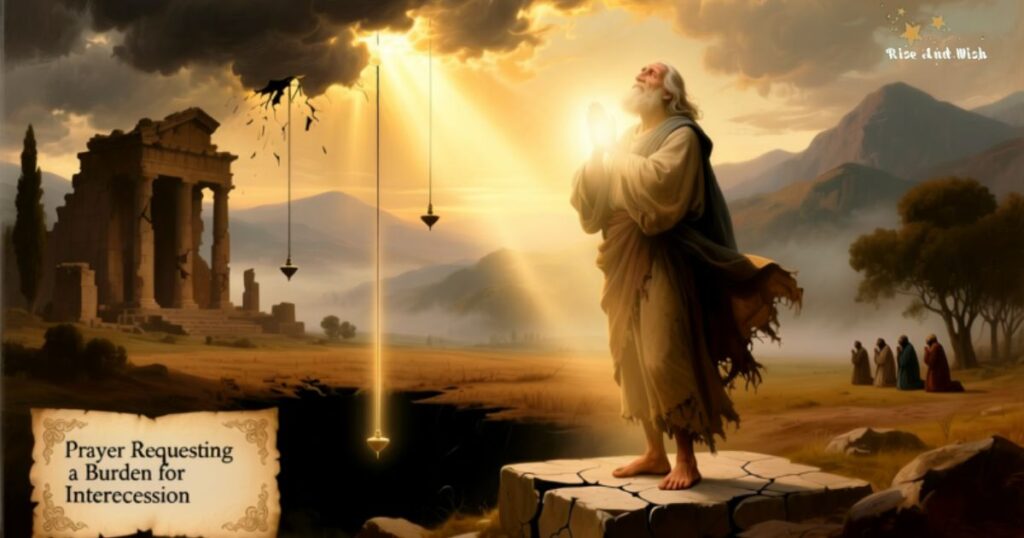Amos saw visions of judgment in Amos 7:1-9 that revealed God’s holiness and the seriousness of sin. Yet, he did not remain silent; he stood before the Lord and pleaded for mercy. His prayer shows us that God values the heart of an intercessor. Through his example, we learn that prayer can move the heart of God and shift His actions.
When we look at Amos’ boldness, we are reminded that true intercession flows from compassion, not mere words. Intercession is about carrying the weight of another’s need and presenting it before God. Amos’ prayer teaches us that even when judgment is near, the cry of the righteous can bring divine mercy. This passage invites us to develop the same burden for prayer that Amos carried.
Understanding the Call to Intercede

God invites His people to share His heart by standing in the gap for others. Intercession is more than praying for ourselves; it is asking God to intervene on behalf of families, nations, and even those who reject Him. In Amos’ vision, we see the role of an intercessor who dares to speak with God for others.
This calling requires spiritual sensitivity. We must be willing to see the brokenness of the world and allow it to move us toward prayer. Intercession is a holy partnership where God allows us to carry a portion of His concern for people. It is both a privilege and a responsibility given to believers.
Intercession is not casual; it requires persistence, compassion, and faith. Just as Amos boldly pleaded, “Lord, forgive, how can Jacob survive? He is so small,” we too must cry out with humility. The call to intercede is a call to see through God’s eyes and respond in prayer.
When God gives visions, burdens, or awareness of judgment, it is not to overwhelm us but to invite us to intercede. Instead of fearing or ignoring what we see, we are called to rise in prayer. Intercession becomes the bridge between divine holiness and human weakness.
Every believer can step into this role. The Holy Spirit equips us with the strength, words, and compassion to pray effectively. Intercession is not reserved for prophets or leaders; it is a ministry for all who are willing to listen and respond to God’s heart.
As Amos stood in the gap for Israel, we too were invited to lift our voices for those in need. Nations, communities, and individuals are waiting for faithful intercessors to pray with courage and faith.
The Weight of Standing in the Gap
To stand in the gap means to feel the weight of others’ pain and bring it before God. Amos understood this burden when he cried out for Israel’s survival. Intercession is heavy because it carries the urgency of life, forgiveness, and destiny. The weight reminds us that prayer is not light work but holy labor.
This burden often presses us to tears and deep groans that words cannot fully express. Paul spoke of the Spirit interceding through us with groanings too deep for words. Standing in the gap pulls us beyond surface prayers into a place of wrestling with God. It is costly, but it reflects the compassion of Christ.
The weight of intercession is not something we can carry alone. We depend on the Holy Spirit to strengthen us and sustain our prayers. Without God’s grace, the responsibility could overwhelm us. But He equips those who intercede, reminding us that He carries the ultimate weight.
Standing in the gap means identifying with the people we pray for. Like Amos, we cry not from judgment but from empathy. We say, “Lord, have mercy,” because we understand their weakness and our own. True intercession is born from humility and compassion.
When we stand in the gap, we align with Jesus, the greatest Intercessor. He continually prays for us at the right hand of the Father. Our prayers become echoes of His voice, joining in His ministry of reconciliation and mercy.
Though the weight is great, the results are greater. Intercession opens doors for mercy, healing, and revival. God honors those who bear the burden of prayer, and through their faith, entire communities can be spared.
Confession: Acknowledging Our Weakness in Prayer

Before we ask God for a deeper burden of intercession, we must confess our own weakness. Too often, we are distracted, self-focused, or quick to give up in prayer. Like the disciples in Gethsemane, we fall asleep when Christ asks us to watch and pray. Confession humbles us and prepares us to receive His help.
We admit that our love can grow cold, and our prayers may lack consistency. We confess that we sometimes pray out of duty rather than genuine compassion. Acknowledging these weaknesses is not failure; it is the first step toward growth in intercession. God responds to honest hearts that confess their need for His strength.
When we confess, we open the door for the Spirit to intercede through us. Romans 8:26 reminds us that we do not know what to pray, but the Spirit helps in our weakness. Confession clears away pride and self-reliance, making space for God’s power to work in us.
True confession is not only about our personal sin but also about the sins of the people we intercede for. Like Daniel, we confess the sins of the nation, crying out for forgiveness and mercy. Intercession often includes repentance on behalf of others, pleading for God’s grace.
Through confession, we learn dependence. We realize that effective intercession is not about eloquent words but surrendered hearts. The power is in God, not in us. By admitting our limitations, we step into His unlimited strength.
Confession keeps our hearts pure and aligned with God’s will. It is the soil from which effective intercession grows. As we humble ourselves before Him, He entrusts us with greater burdens to carry in prayer.
Asking God for a Burdened Heart
The burden for intercession is not something we create; it is something God gives. We must ask Him to place His concerns on our hearts. Just as Amos saw visions that stirred him to pray, we need God to open our eyes to the needs around us. Prayer begins with asking Him for His perspective.
When we ask for a burdened heart, we are inviting God to break us with what breaks Him. This may mean sleepless nights, tears for strangers, or prayers for nations we’ve never visited. A burdened heart feels the weight of eternity and the urgency of salvation.
Asking for this burden requires courage. It means saying yes to a calling that may change our priorities, schedules, and comfort. But when we carry God’s burden, we also carry His joy, knowing that our prayers are shaping destinies.
We must be intentional in prayer: “Lord, give me Your heart for this person, this church, this nation.” When we seek, He responds by softening our hearts and aligning them with His. The burden becomes a gift, drawing us closer to Him.
God never gives a burden without grace. With the weight comes strength, encouragement, and the assurance of His presence. Asking for a burdened heart is asking to be entrusted with God’s compassion. It is a sacred responsibility.
Through this prayer, we move beyond casual Christianity into deep partnership with God. We become co-laborers with Christ, carrying His heart into our prayers and releasing His mercy into the world.
Prayer Requesting a Burden for Intercession

Heavenly Father, I come before You acknowledging my weakness in prayer. Too often I have prayed lightly, without feeling the true weight of others’ needs. Forgive me for my indifference, and cleanse my heart from selfishness. I ask for Your mercy to shape me into a faithful intercessor.
Lord, just as You gave Amos visions that stirred him to intercede, open my eyes to see what You see. Break my heart for the lost, the hurting, and the nations that need Your mercy. Place upon me a holy burden that moves me to pray with passion and persistence.
Teach me to stand in the gap with humility and faith. When I grow weary, remind me that Your Spirit intercedes through me. Let my prayers echo the heart of Christ, who pleads continually for His people. Strengthen me to carry this calling without fear or pride.
Lord, help me to identify with the pain of others and cry out for them as Amos did. Remove complacency and replace it with compassion. Let my tears and groans become prayers that rise like incense before Your throne.
Grant me a heart that will not give up, even when answers seem delayed. Fill me with hope, knowing that You are a God who hears and responds. May my intercession open doors for mercy, healing, and revival in families, communities, and nations.
I surrender to Your will and ask that You trust me with greater burdens for prayer. Make me faithful as a watchman on the walls, standing alert and interceding until Your purposes are fulfilled. In Jesus’ name, Amen.
Encouragement: God Responds to Intercessors
Amos’ story reminds us that God listens to the prayers of His people. Twice in Amos 7, God relented because of Amos’ intercession. This shows us that our prayers matter and that heaven responds when believers cry out. Intercessors are not powerless; they are vessels of God’s mercy.
Sometimes it may feel like our prayers are unnoticed, but Scripture assures us otherwise. God treasures the prayers of the saints like incense before His throne. No prayer is wasted, and no burden is ignored. He delights in partnering with His children through intercession.
God’s willingness to respond shows His mercy. Though He is just and holy, He is also compassionate. Intercession moves His heart because it reflects the love of His Son. When we pray for others, we align with Christ’s sacrifice and ministry of reconciliation.
Encouragement also comes in knowing that intercession not only changes situations but also changes us. The more we pray, the more we grow in compassion, patience, and faith. God uses intercession to shape us into His likeness.
We may not always see immediate results, but prayer is powerful in unseen ways. God may delay, redirect, or answer in unexpected ways, but He always honors sincere intercession. Faith teaches us to trust even when we do not yet see.
Be encouraged: when you carry the burden of intercession, you are never alone. Christ, the Spirit, and the church join in this holy calling. Together, your prayers can bring light where there is darkness and hope where there is despair.
Living Faithfully as God’s Watchmen
God calls intercessors to be watchmen on the walls, alert, prayerful, and faithful. A watchman does not sleep when danger approaches; he stays awake to sound the alarm. In prayer, we take this role, watching over our families, communities, and nations with spiritual vigilance.
Living as a watchman means being consistent. Prayer cannot be occasional; it must be a lifestyle. Just as Amos was available when God revealed His visions, we must remain attentive to the Spirit’s prompting at all times. Faithfulness is the foundation of intercession.
A watchman also carries responsibility. Silence can be dangerous if God has given us insight or warnings. Our prayers act as spiritual protection, shielding others from harm and inviting God’s intervention. Faithful watchmen respond to every nudge from the Lord.
This calling is not about fear but about readiness. A watchman does not panic but trusts the God who never slumbers. We stand in confidence, knowing that the Lord is our strength and our refuge. Prayer becomes an act of faith and trust.
Living as God’s watchmen also means embracing perseverance. Some battles require long seasons of prayer, but the faithful intercessor does not give up. With every prayer, we declare God’s authority and resist the schemes of the enemy.
Finally, a watchman’s reward is seeing God’s salvation break through. Faithful prayers bring protection, revival, and transformation. Living in this role is an honor, as we partner with heaven in guarding what God loves most, His people.
Conclusion:
The story of Amos reminds us that intercession is both a gift and a responsibility. God shares His heart with those who are willing to carry the burden of prayer. By standing in the gap, we join in His work of mercy and redemption. This calling is not heavy when we trust Him to supply the strength.
Carrying God’s heart for others transforms the way we live. We become more compassionate, more faithful, and more attuned to His Spirit. Our prayers reach beyond our own needs and touch the lives of people we may never meet. In this, we reflect the love of Christ to the world.
Frequently Asked Questions
What does it mean to have a burden for intercession?
A burden for intercession means feeling a deep spiritual weight to pray for others. It is God’s way of sharing His heart with us so that we stand in the gap and plead for mercy, healing, and salvation on behalf of others.
How do I know if God is calling me to intercede?
You may feel an unusual concern, compassion, or urgency to pray for someone, a community, or even a nation. God often stirs this through Scripture, visions, or an inner conviction that won’t go away until you pray.
Why is Amos 7:1-9 important for intercessors?
Amos 7:1-9 shows us that intercession can move God’s heart. Twice, Amos prayed and God relented from judgment. This passage teaches that faithful prayer makes a real difference in how God deals with people and nations.
Can intercession really change situations?
Yes. While God is sovereign, He chooses to work through the prayers of His people. Intercession invites His mercy, protection, and transformation into circumstances that might otherwise face judgment or destruction.
